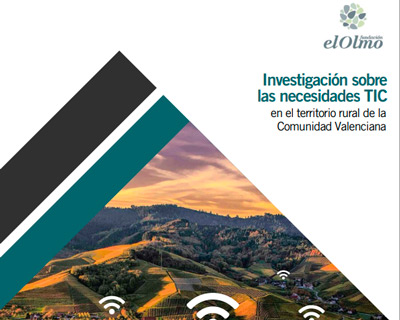ICT in rural areas
This is the first survey conducted in the Valencian Community on this territorial area covering populations of less than 5,000 inhabitants and their relationship with ICTs. The socio-occupational and socio-economic characterisation of survey respondents shows some relevant data that are also specific to rural areas.
They have a higher level of employability than in cities, i.e. an unemployment rate several points lower than in urban areas.
Half of those surveyed are active and working, either self-employed or employed.
Among regular internet users, 63.8 % have a desktop or laptop, 54.1 % have a tablet, 41.9 % have a landline phone (including wireless) and 81.8 % have a mobile phone. These percentages reflect to some extent the part of the population affected for various reasons by the so-called digital divide, which is more acute in rural areas than in urban areas.
The survey shows an insufficient deployment of the broadband network with a high percentage of the population saying that they do not use the internet and do not need it, an aspect that will need to be analysed from the perspective of a digitalisation of public services that could leave out citizens who do not adapt to this process.
Household broadband connectivity is lower than in cities and is a sign of the delay in the deployment of this infrastructure in rural areas.
The user profiles that emerge among the population using the Internet are similar to urban profiles, particularly those for leisure contents, which are higher than those for professional use.
The use of the Internet to interact with public administrations appears to be a very useful alternative, although the quality of services in terms of ease and usability are highly critical of the quality of some public administration services.
The assessment of e-government by survey respondents who use the Internet in their interactions with administrations is generally moderate, with only 52.5% rating it as very good or satisfactory.
Innovation through ICT is very positively perceived in services, trade and e-government, with percentages above 80%, and to a less extent in traditional activities such as agriculture and livestock farming.
As to whether innovation through ICTs improves environmental sustainability in rural areas, it is also perceived in similar values, although slightly lower in both groups.
The rural reality in real time
Research has enabled the development of a tool that allows direct enquiries to be made on an open database containing relevant indicators for municipalities with less than 5,000 inhabitants in the Valencian Community using a connection with data from the Valencian Institute of Statistics (IVE-GVA). Access to this service is open and can be provisionally found at the following UPV link: https://ticruralcv.upv.es/
The importance of this tool stems from the fact that it is the first open database under the “Proximity Data” model that is being developed with the aim of further increasing its information content through the deployment and development of the use of ICT in rural areas for open and free use. This is the first stage in the development process that will be completed with the creation of a Geographic Information System (GIS) in multilevel layers that will enable sectorised information to be displayed in rural areas of the Valencian Community or on the whole of the Valencian territorial map, according to search criteria selected by the user.
The usefulness of the tool is clearly proven in the example of the case of populations at risk of depopulation, in which an image that coincides with the data that have been presented in different sections of the research is shown. The potential capacity of this tool is very high due to the number of indicators that can be linked for analysis, the development technology used through a platform that meets the interoperability requirements of advanced SmartCities models and an open system that allows the continuous growth of its linked data structure regarding databases from other platforms or through the incorporation of validated self-billing data. The information and communication society is aimed at the knowledge society. For this reason, the research has incorporated as a novelty the presentation of final results in this dynamic tool that is constantly updated by the IVE and that will allow from now on to grow and adapt its content to the demand and expectations generated by user interaction.
In the information and communication society, technical development comes from cities, ICT infrastructures and applications have been created from an urban perspective, but thinking that the same model would work for rural areas would be a great mistake and failed investment for multiple reasons. ICT infrastructures: for platforms providing multiple services specific to rural areas through Apps, it is also necessary to incorporate rural culture in aspects such as their conceptualisation and the development of usability processes. Innovation Centres are essential for digital transition. Cities are provided with multiple learning spaces for digitalisation: HUBs, Coworking, Living Labs, Media Labs, etc. have been the learning tools that cities have had for digital transition, something that does not exist in rural populations.
ICTs, rural areas, ecological sociology, sustainable innovation
- Rodriguez Victoriano, Jose Manuel
- PDI-Titular d'Universitat
- Castello Cogollos, Rafael
- PDI-Titular d'Universitat
- Vila Lladosa, Luis Eduardo
- PDI-Catedratic/a d'Universitat
- Antonio Collado Izquierdo (El Olmo Foundation)
- Mª Jesús Navarro Rios (Miguel Hernández University of Elche)
- Juan Miguel García-Gómez (Universitat Politècnica de València)
- El Olmo Foundation
- Valencian Department of Innovation, Universities, Science and Digital Society of the Valencian Government








